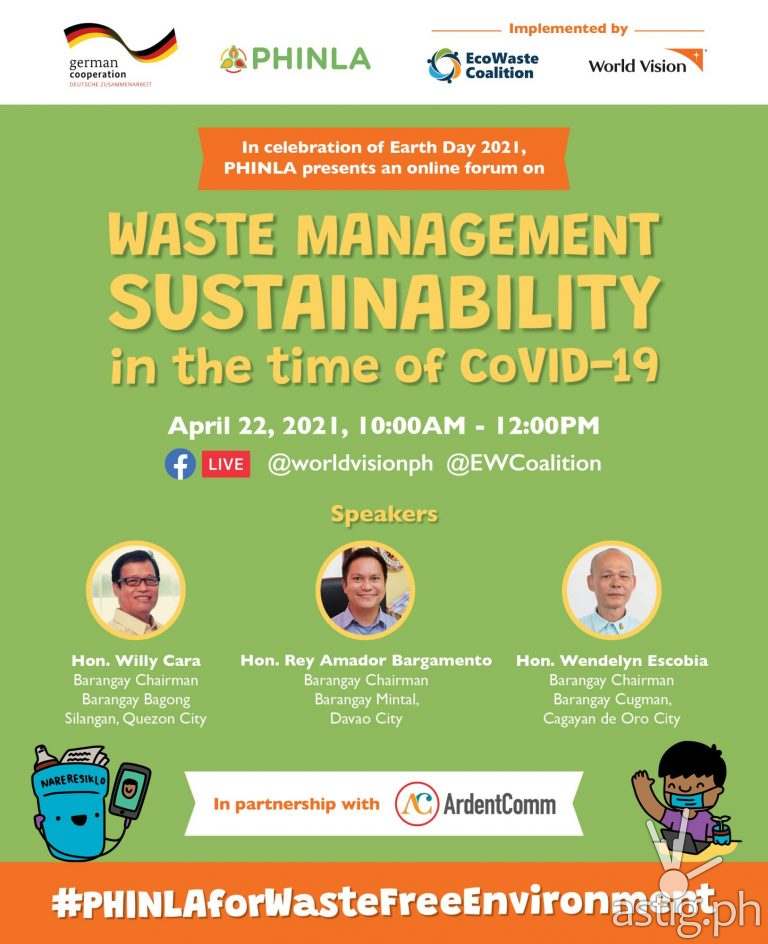PHILIPPINES – After a year since COVID-19 hit the Philippines, the pandemic continues to pose enormous risks and challenges across many levels of the society. Waste management is no exception.
Since safety is the topmost priority, people opt to use disposable products as an added layer of protection.
The Philippines has already been recorded as one of the world’s leading waste contributors. Approximately 15 million tons of wastes are generated in the country each year. This figure does not yet reflect the waste generated during the pandemic.
Studies show that billions of face masks, plastic gloves, and disposable personal protective equipment (PPE) sets are being produced and used globally during the pandemic. Unfortunately, many of these end up in waterways, in the oceans, and open seas.
The waste management problems posed by COVID-19 beset LGUs, many of whom still struggle to implement the provisions of Republic Act (RA) No. 9003 or the Ecological Solid Waste Management Act of 2000.
“With total lockdowns and the closure of majority of business establishments in the country to enforce physical distancing, there was a surge in demand for home delivery services of food and groceries, which has led to an increase in the generation of common packaging plastic wastes,” shared Joben Asuncion, Project Coordinator of PHINLA (Philippines, Indonesia, Sri Lanka) Global Program. “Due to reduced recycling activities as a result of coronavirus outbreak, management and handling of plastic waste has become a huge challenge for the waste management particularly in our communities,” Asuncion added.
Based on the 2018 figures from the National Solid Waste Management Commission (NSWMC), there are only more than 10,000 materials recovery facilities in the country catering to the more than 40,000 barangays in the Philippines. These challenges call for more proactive responses not only from the government but from all sectors.
The lingering waste management concerns require intensified education campaigns to raise the public’s understanding that everyone has a role in solving waste management problems. “Education is the key to success and it opens opportunities, making it possible for each of us to contribute to a progressive, healthy and sustainable society. The effects are already visible and will be catastrophic unless we act now,” Asuncion explained.
In helping to achieve this goal, PHINLA, a partnership project of World Vision Development Foundation and EcoWaste Coalition, carries out a series of advocacy campaigns among household members, LGU officials, waste collectors, and students across the country as part of the project’s aim to assist LGUs and other stakeholders to improve waste management systems, livelihood opportunities to waste collectors, and raise the public’s active involvement to address the waste problem in the communities.
“Through waste management education, innovation, and adherence to our commitments, we can make the necessary changes to protect our planet,” Asuncion added.
Earth Day Forum
As part of its advocacy campaigns, PHINLA held an online forum during the Earth Day celebration to showcase how the LGUs of Quezon City, Cagayan de Oro City, and Davao City respond to the ever-present challenge of managing solid wastes, now aggravated by the pandemic.
In the said forum, Cugman, Cagayan de Oro Chairman Wendelyn Escobia shared that the LGU is implementing the “no segregation, no collection” policy and has designated a segregation bin and material recovery facility for collected wastes.
However, garbage collection in their village paused for a while during the implementation of community quarantine. Garbage piled up, and collection was made even more challenging because they were using only one mini dump truck to collect their wastes. As a response, the LGU intensified its information drive about solid waste segregation through house-to-house campaigns. The local government also passed an ordinance for the proper disposal of PPE and encouraged urban container gardening through the help of the bio shredder donated by PHINLA.
“Through the help of PHINLA, our waste collectors in Cugman no longer spend a lot of time segregating wastes because it’s being done already in the household level. The pedicabs and motorbikes donated by PHINLA also made their jobs easier,” Escobia shared.
In Quezon City, several activities are being done to manage the city’s solid wastes, including weekly cleanup drive, tree planting activities, and declogging operations. The city is also implementing the “no segregation, no collection” policy. Barangay Bagong Silangan, Quezon City Chairman Wilfredo Cara said “I would like to thank World Vision, EcoWaste Coalition, and PHINLA for the assistance they provide to our barangay especially in this time of pandemic.” Through the program, Bagong Silangan received waste collection vehicles, face masks, gloves, and other protective equipment for their waste collectors.
Meanwhile, Chairman Rey Amador Bargamento of Barangay Mintal, Davao City shared that as early as 2013, Mintal has already been intentional in intensifying segregation at source. There was high compliance, but logistic limitations took a toll on their campaign. They had no clear collection schedule and had only one mini dump truck catering to 23 areas.
“When we started, we were lacking knowledge, equipment, and personnel. That’s why we are grateful that PHINLA partnered with us. We had training activities already. We have the tools that we need. Our partnership with PHINLA helps us in making segregation at source an ultimate goal in Barangay Mintal. It makes our dream for a clean branagay closer to reality,” said Chairman Bargamento.
PHINLA is set to carry out series of training activities for waste collectors, LGUs household members, and students this year. More units of pedicabs and motorbikes will also be donated to its partner LGUs.


